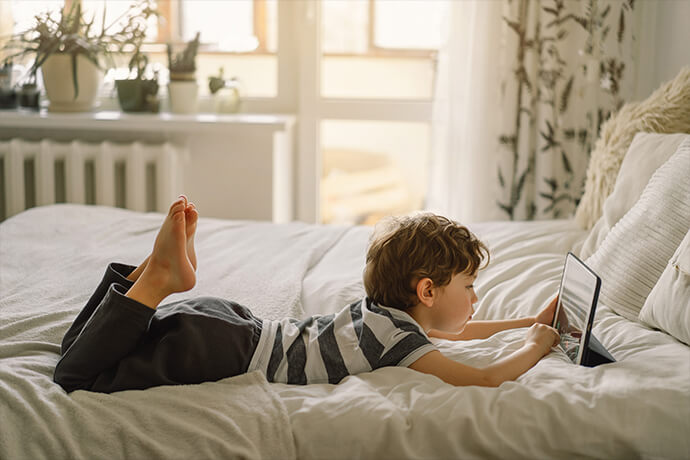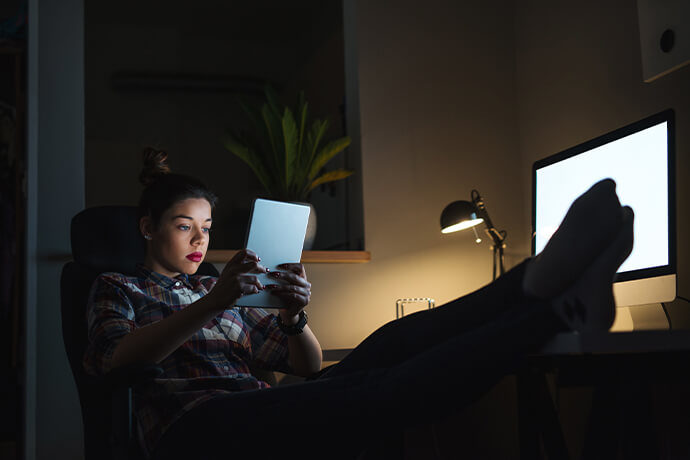 SPEAKERS
SPEAKERS
 TOPICS
TOPICS
Maintaining healthy screen habits is crucial. Learn about recommended screen time by age and the effects of excessive usage, including addiction.

Screens — phones, laptops, tablets, and TVs — are a blessing and a menace. These modes help aus communicate, learn, and get entertained. Yet, for screens to remain beneficial, you must stick to healthy habits, adhering to the recommended screen time by age.
Otherwise, young and older adults suffer different effects when disregarding digital wellbeing. Addiction is among the most problematic habits for everyone’s excessive screen time, and we’ll get into the specifics momentarily.
In parts, we’ll discuss the dangers of excessive screen time and share ways to reduce screen time. Screen time reduction is crucial for a healthy digital detox, which all wellbeing speakers advocate for.
Let’s begin.
How much screen time is too much?
The average screen time is 6 hours and 40 minutes daily. This number changes demographically by age and location. American teenagers go beyond 8 hours daily, and below are some of the related dangers to excessive screen time.
The human anatomy relies on movement. Spending too much time stagnant watching movies, playing games, or working on a chair keeps us immobile for hours.
But that is not all:
Some of the earliest adverse effects of physical health due to excessive screen time are:
Your mental health also takes a blow when you spend too much time glued to a screen.
Excess screen time may cause mental health decline, worsen stress, or aggravate body image issues. The reasons that lead to the corrosion of one’s mental health and digital wellbeing include the increased cases of:
Ever notice you can't seem to put your phone down before bed? The reason behind this may be the blue light all our devices emit. That blue light messes with your sleep!
This makes falling and staying asleep harder, leaving you tired and groggy the next day.
The ripple effect of an 8-hour average screen time for teens and other people extends to lower focus and productivity. Here is how:
Screens are inherently distracting. The constant notifications and pop-ups on social and work networks are the culprit here. These distractions make it difficult for anyone to focus on one task at a time, lowering focus and productivity.
On a typical day, one receives news from friends, family, and numerous sites, all needing our full attention. This information overload can impact productivity without prioritization, mindfulness, and screen breaks.
All the screens we interact with want you to make a decision each time. All sites want you to decide whether to click to view a story, respond to an email, reply to a text, or initiate a conversation.
This constant back-and-forth can lead to decision fatigue. It makes you rush to make decisions that can be life-altering. Imagine you are an accountant spending eight or more hours glued to a screen. You may send a client the wrong information or mess up a transaction, leading to dire consequences.
Humans learn most things through person-to-person interactions. We learn and thoroughly enjoy how to communicate, play, sing, and more through human-to-human interactions.
Unfortunately, excess screen time steals away this privilege.
Children and adolescents with less social interaction never develop social skills that help them navigate the world. They never learn to make, keep, and properly communicate with friends, colleagues, and others.
Children who rely heavily on screens for education and entertainment have delays in their cognitive and social-emotional growth.
This leads to issues in communication and problem-solving.

The constant pull of notifications, social media, and endless streaming options can easily dominate our attention, but we have a few suggestions to help.
The following explores ways to reduce screen time and boost your digital detox!
When you notice you are spending a lot of time on a screen, acknowledge that that may be a problem.
First, track your habits by checking most devices’ built-in screen time trackers. If you note that the time is beyond 7 hours, it’s time to make changes.
The next step is to identify the triggers that lead to mindless screen scrolling. Is it boredom, social anxiety, commuting, or any other thing?
Whatever it is, you may seek alternative distractions like reading a book, chatting with a stranger, or simply enjoying the commute. Other suggestions are participating in a hobby, spending time in nature, or visiting a friend.
One way to set a screen time reduction structure around screen times is to schedule screen-free zones. The locations and timings you may use under this rule can be bedtime, mealtime, or social gatherings.
You may also use app timers that lock you out after a specified period.
Put your phone on the airplane or in silent mode when you sleep or work. Setting such boundaries helps you focus on one thing at a time: work, play, or sleep.
Be deliberate and silence notifications and ringtones when concentrating on one task. Keep the phone or tablet away because if it is out of sight, it’s out of mind.
You may switch the mode to grayscale for your kids to make scrolling less appealing. Parental controls can also help with limiting screen times beyond specific time stipulations.
One sure way to remain consistent with healthy habits is to reward yourself, even with small wins. You may treat yourself to a relaxing bath, an activity you adore, or a nice dinner for the steps you have made.

We all now know excess screen time can be detrimental. But how much is too much? This section explores recommended screen time limits for different age groups, helping you find a healthy balance.
Here is the recommended screen time by age:
For a healthier relationship with technology, consider establishing ground rules for the whole family in addition to the above.
This could include creating screen-free zones, like during meals or family time. Utilize parental device controls to help manage content and control screen time.
Parents should model healthy tech habits by offering alternative distractions for kids. Reading books together, exploring arts and crafts, or singing songs could work.
Create a tech-free haven in the bedroom by keeping phones and devices out of sleeping areas. Finally, establishing a screen-free window (30-60 minutes) before bedtime will promote better sleep quality for everyone.

Never allow yourself or your loved one to be caught in the trap of excess screen time.
As seen, it has negative implications on your physical and mental health. Excessive screen time also affects sleep patterns, productivity, and social interactions. It also leads to developmental delays in kids.
You can change the narrative with habit tracking and replacement, boundary-setting, and making scrolling less appealing. Rewarding yourself after every small change encourages body, mind, and digital wellbeing.
Remember, reducing screen time isn’t a punishment but a digital wellbeing liberation. Sleeping better, building healthy relationships, and working in your best state is liberation.